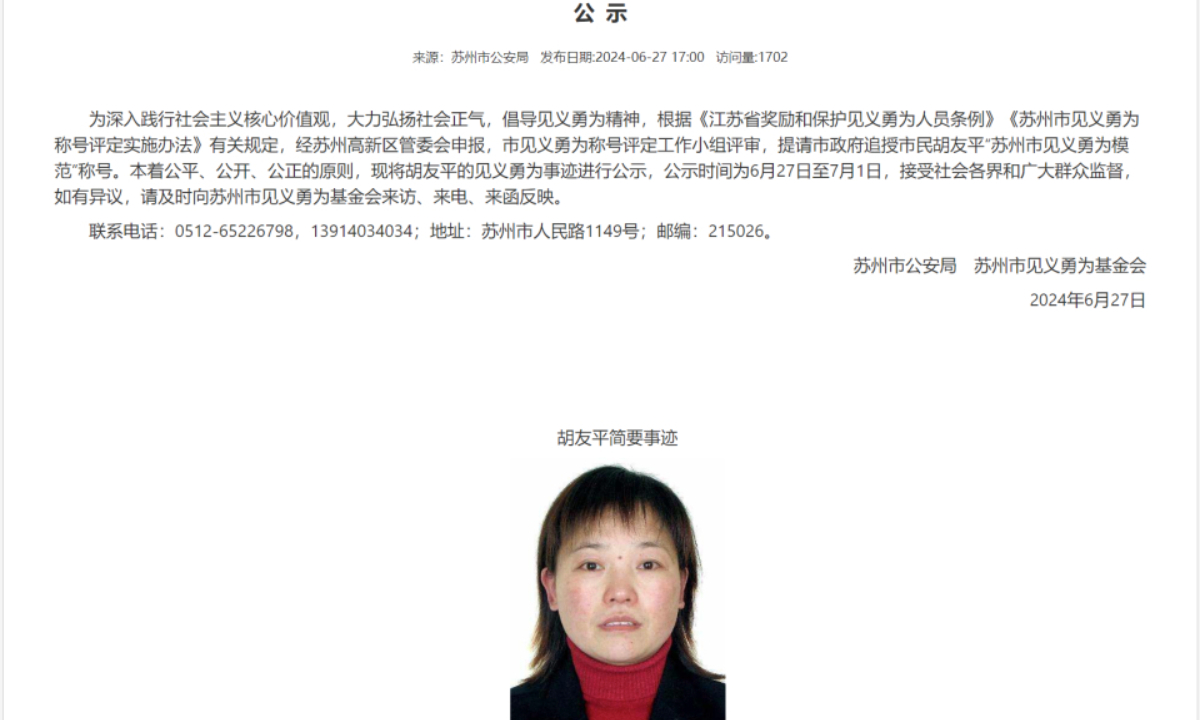
Photo: Local authorities in Suzhou
Chinese social media platforms announced in succession to regulate extreme resentful remarks which incite nationalism and spread hatred against Japan after the tragic death of a Chinese woman who tried to stop a knife-wielding assailant attacking two Japanese people at a bus stop in Suzhou, East China’s Jiangsu Province, on June 24.
Hu Youping, 55, was stabbed multiple times by the 52-year-old suspect surnamed Zhou, who recently arrived in the city and was unemployed. Hu eventually passed away despite rescue efforts, and was mourned as the city’s hero. Zhou was apprehended at the scene.
The incident immediately became the focus of public opinions and sparked some extreme comments and discussions that incited nationalistic sentiment, promoted group hatred and even applauded criminal behavior in the name of patriotism on social media.
As of Sunday, multiple social media platforms including Sina Weibo, Douban, NetEase, Tencent, Douyin and ifeng.com have released announcements to regulate relevant extreme speeches by banning posting or thoroughly shutting down the accounts.
The anti-Japanese sentiment among the Chinese public gets better or worse according with the state of China-Japan relations. Over the past few months, many posts and short videos from various sources have spread rumors targeting Japanese schools in China, suggesting that these schools are linked to spies training.
Many comments left under such posts and videos expressing resentful emotion calling for driving these Japanese schools out of China.
After the incident in Suzhou, such posts and videos were removed from the social media platforms or were restricted from being viewed.
China’s X-like platform Sina Weibo released the first regulatory statement on late Wednesday night, saying that it found some users deviated from rational discussion and over-interpreted the incident. They posted extreme opinions that incite nationalistic sentiment, promote group hatred and even applaud criminal behaviors in the name of patriotism.
To address the issue, the platform took punitive measures including
removing 759 posts that incite hatred and beautify crimes, and punishing 36 accounts that spread related content, from suspension to permanent shutting down the accounts.
Tencent, owner of WeChat, also said in its statement released on Saturday that some internet users incite confrontation between China and Japan, stir up extreme nationalism, and create various extreme remarks. The platform vowed to resolutely crack down on such illegal content and accounts, and noted that it had handled a total of 836 relevant posts and 61 accounts. Depending on the severity of the violation and platform rules, measures taken include banning posts and shutting down accounts.
Some observers pointed out that content platforms and social media have long been hotbeds for extreme nationalist and populist rhetoric. However, these platforms have not only tolerated such content, but have even encouraged it, the reason for which is simply that this type of content brings in huge profits for the platforms through increased clicks and views.
Since the beginning of this year, information inciting confrontation between China and Japan has been rampant on the internet. Incidents such as malicious online rumors about Chinese bottled water producer Nongfu Spring, claiming that the architectural patterns on the packaging of the Oriental Leaf Green Tea drink resembled patterns of Japanese religious buildings and other symbols, and the recent incident of a Chinese national allegedly spray-painting the word “toilet” on a stone pillar at the Yasukuni Shrine in Tokyo on June 1, all created a huge uproar on social media.
On Sunday, Chinese media professional Hu Xijin wrote on Sina Weibo that the fact that major commercial internet platforms have taken action to address online comments that incite confrontation between China and Japanese and stir up extreme nationalist sentiments, undoubtedly reflects the will of the Chinese authorities.
Hu said that all people need to clearly understand this strong signal, and those who feel uncomfortable about it need to make necessary cognitive and emotional adjustments to integrate with the mainstream stance and attitude of the Chinese society.
Global Times




